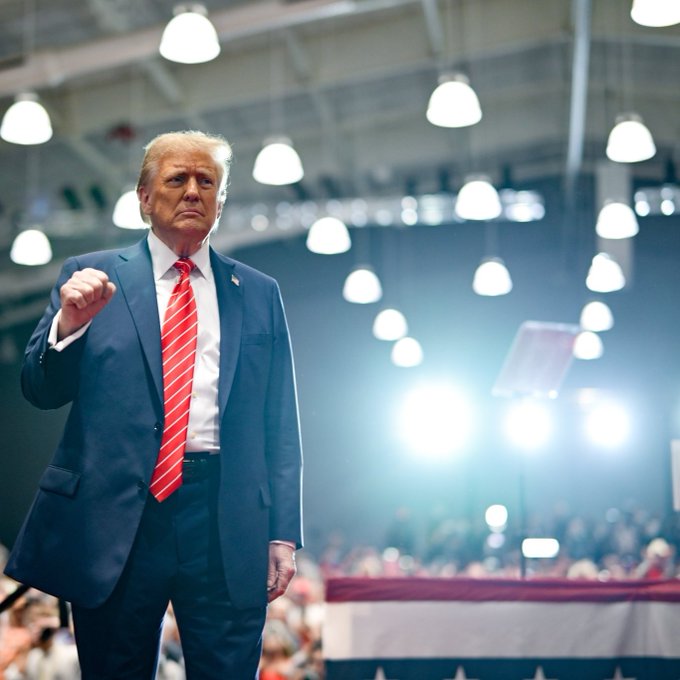Former U.S. President Donald Trump has proposed a groundbreaking immigration reform aimed at retaining top global talent and preventing brain drain by automatically granting green cards to all graduates of U.S. colleges. This ambitious move, which seeks to retain skilled professionals in the U.S., targets graduates from both two-year and four-year universities, as well as doctoral programs, regardless of the prestige of their alma mater or their field of study.
In an interview discussing the initiative, Trump voiced concerns about the loss of brilliant minds who leave the U.S. after graduation due to restrictive visa limitations. He pointed out that this issue particularly affects international students, many of whom, after completing their studies in the U.S., are forced to return to their home countries. These countries, such as India and China, have seen the return of former students who go on to build multi-billion-dollar companies, creating jobs and wealth abroad rather than within the U.S.
“We lose out when phenomenal individuals from institutions like Harvard or MIT—or even lesser-known colleges producing exceptional talent—are forced to leave,” Trump stated. “This is not just a loss for them, but a significant blow to our economy.”
Trump’s proposal highlights a growing concern in the U.S. about the importance of retaining foreign-born talent, especially in industries that rely heavily on highly skilled professionals, such as technology and engineering. Many U.S. companies are facing shortages of qualified workers, and Trump’s plan aims to address this issue by providing a more direct pathway for international students to stay and contribute to the U.S. economy after graduation.
Trump’s administration had previously clamped down on immigration policies, which critics argued had stifled the ability of the U.S. to attract and retain top talent. However, his new proposal offers a stark contrast, with the goal of eliminating the barriers that prevent international graduates from staying in the country. “The current immigration system is counterproductive,” Trump said. “It discourages innovation and growth by sending our brightest minds back to their countries of origin.”
Under the new plan, international students who graduate from U.S. universities would automatically receive a green card, making them eligible to live and work in the country without the bureaucratic hurdles that often accompany the visa process. This move is aimed at attracting the best and brightest to remain in the U.S. and contribute to its growing industries, especially in sectors such as tech, healthcare, and research and development.
The proposal comes at a time when the U.S. is grappling with increased competition from other nations, particularly China and India, which have ramped up efforts to attract talented professionals and students. The competition for skilled workers is fierce, with countries offering attractive incentives to keep graduates and entrepreneurs at home.
While the proposal is aimed at retaining global talent, it has sparked debate about its potential impact on U.S. citizens and the job market. Some critics argue that the plan could undermine opportunities for American workers, while others express concern that it could lead to an influx of international professionals in certain industries, creating a strain on local job markets.
However, Trump argues that the long-term benefits of retaining top talent far outweigh any short-term concerns. “Companies need brilliant people to innovate and grow,” he said. “Forcing the brightest graduates to leave not only undermines their potential but also hurts our businesses.”
The proposal also comes at a time when the U.S. is facing significant challenges in the global race for talent. Many countries have adopted more liberal immigration policies to attract skilled professionals. In particular, countries like Canada and Australia have introduced initiatives aimed at drawing in highly educated immigrants with specialized skills, while the U.S. has been criticized for its increasingly complex visa processes and restrictions on foreign workers.
Trump’s plan could offer a significant shift in how the U.S. views immigration, positioning the country as a leader in the global talent competition. If enacted, the proposal could lead to a surge of highly skilled workers in fields like technology, finance, and engineering, industries that are critical to the U.S. economy.
The policy would also help address the issue of “brain drain,” which is the emigration of highly skilled professionals from their home countries in search of better opportunities. Many of these professionals, who often attend prestigious U.S. universities, are forced to return to countries where they have limited opportunities to apply their skills, ultimately contributing to the growth of economies outside the U.S.
“We send them back to countries like India and China, and they end up building companies that employ thousands of people there,” Trump lamented. “Instead, we should be keeping them here, where they can help us build new industries and keep our economy competitive.”
The proposal has garnered support from some business leaders who see the potential for a surge in innovation and economic growth. Prominent tech executives have praised the idea of keeping top talent in the U.S., particularly as the country faces challenges in filling positions in high-demand fields.
However, there are those who view the plan with skepticism. Immigration advocates and some lawmakers argue that the proposal may not address the underlying issues facing U.S. immigration policy, including the treatment of undocumented workers and the broader need for comprehensive reform. Some critics argue that the plan could exacerbate existing inequalities, particularly for those without the means to attend prestigious U.S. universities.

